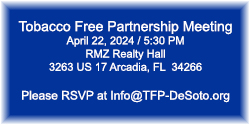Tobacco Free Partnership resources
Below is a list of currently available resources within DeSoto County.
Electronic Cigarettes and Other Vaping Devices
Electronic cigarettes are devices that deliver aerosol to
the user by heating a liquid. There are many varieties
and flavors of “e-liquids,” many of which contain
nicotine.
The aerosol that e-cigarettes emit is not tobacco smoke,
but it is not harmless. Studies have shown that
dangerous chemicals, such as formaldehyde and
acetaldehyde, are measurable from some e-cigarette
aerosol. Bystanders exposed to e-cigarette aerosol can
also absorb its nicotine.
E-cigarettes range from smaller conventional cigarette
lookalikes to more powerful devices that deliver more
aerosol per inhalation. The e-cigarette product line
continues to grow with time – there are more than 460
brands currently on the market, with varying chemicals
used in e-liquids.
E-liquids come in a variety of flavors and nicotine doses. Though it comes in a small bottle, liquid nicotine can be dangerous. Exposure to liquid nicotine by swallowing or contact with the skin can result in nausea and vomiting, respiratory arrest, seizures or even death.
The number of Americans using e-cigarettes has
increased dramatically. Between 2010 and 2013, the
percentage of cigarette smokers who had used an
e-cigarette increased from 9.8 percent to 36.5
percent. Though current cigarette smokers and
recent former smokers are more likely to use
e-cigarettes than adults who have never smoked,
nonsmokers are still trying e-cigarettes.
The United States Surgeon General released a report
in December 2016 warning against youth use of
e-cigarettes. In Florida, the number of high school
students who were current e-cigarette users
increased 66 percent from 10.8 percent in 2014
to 18.0 percent in 2016. Further, because the adolescent brain is still
developing, nicotine use during adolescence can
affect teens’ susceptibility to addiction.
JUUL, a new e-cigarette shaped like a USB flash drive, is being used by students in schools. All JUUL e-cigarettes have a high level of nicotine. According to the manufacturer, a single JUUL pod contains as much nicotine as a pack of 20 regular cigarettes.
JUUL became available for sale in the United States in 2015. As of December 2017, JUUL is the top-selling e-cigarette brand in the United States. News outlets and social media sites report widespread use of JUUL by students in schools, including in classrooms and bathrooms.
Tobacco Prevention Programs
Secondhand Smoke: Who is at Risk in DeSoto County?
About 10% of all tobacco-related deaths occur as a result of secondhand smoke exposure. Middle school and high school students in DeSoto County report being exposed to secondhand smoke at rates significantly higher than the Florida average. This presentation looks at the risks associated with secondhand smoke, and the impact of clean air legislation on reducing secondhand smokes exposure.
SmokeScreeners: The Impact of Onscreen Smoking on Youth Tobacco Initiation
Recent surveys reveal that one-third to one-half of all teenage smokers made the decision to use tobacco because it "looked cool in a movie". Most tobacco use in functions subliminally by normalizing tobacco use. Since 1990, there has been a dramatic increase in the amount of smoking in movies, especially PG-13 movies marketed to middle-school students. The SmokeScreeners program teaches media literacy skills designed to reduce the influence of movie smoking.
Store Alert! Point of Purchase Tobacco Advertising
The Tobacco Industry currently spends $13 Billion each year to market their products in the United States; of that nearly $1 Billion is spent in Florida alone. That $13 Billion dollars breaks down to roughly $10,000 dollars spent on every new youth smoker recruited each year. 85% of that marketing budget is spent on Point-of-Purchase marketing... the advertisments, price-breaks, and give-aways that you see every day in your local tobacco retailers. Most of this is found in convenience stores in your neighborhoods.
The Store Alert program teaches young people to be aware of the types of marketing gimmicks used by the Tobacco Industry in local stores. An additional prorgam is available to train youth on a system to conduct surveillance in the community and report the results as part of a database maintained by the Campaign for Tobacco Free Kids.
Strange Candy: How the Tobacco Industry Targets Youth
After the Master Settlement Agreement of 1998, which resolved a series of lawsuits between the States and the Tobacco Industry, the industry agreed to a number of new marketing restrictions, including reduced magazine advertising, and the elimnation of cartoon characters from all ads. The Tobacco Industry then exploited every loophole in the agreement, including the marketing of new candy-flavored tobacco products to entice youth.
While the new Food and Drug Administration rules regulating tobacco products has banned flavored cigarettes, tobacco manufacturers continue to exploit loopholes in the FDA legislation, including newer kid-friendly smokeless products and flavored cigars... neither of which is currently regulated by the FDA!
The Strange Candy program discusses issues of tobacco marketing with a focus on the issue of flavored tobacco products.
Call to Schedule a Program
Most of these presentations can also be tailored to an adult audience, such as a PTA. If you are interested in scheduling a program, please contact us at info@TFP-DeSoto.org. All programs are free-of-charge within DeSoto County.




